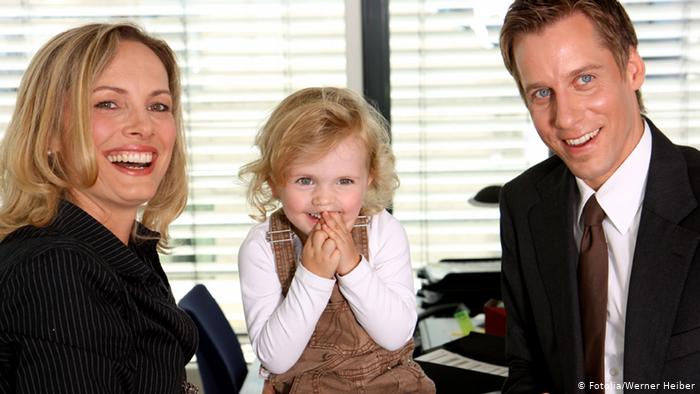More children are born in Germany. The press is pleased, but it is far from euphoria. Although in the German family policy Has done a lot in recent years, the conditions are far from ideal. And that they are the cause of the trend towards children is questioned. Isn’t it perhaps the longing for some permanence??

More children are born. It is not yet clear whether the trend will be long-term.
"Provided they are true, these statistics would be the Most surprising of 2010: Germany is waving a baby boom. Despite the financial and economic crisis, despite climate change, despite the falling number of women capable of giving birth", write the country newspaper from Lüneburg, is skeptical about the sustainability of this trend: "Cheers would be premature. Family policy needs staying power, as the example of France shows. At the beginning of the French baby boom there was the defeat against Hitler Germany in 1940. De Gaulle attributed this to the fact that France was the least born country in Europe. Since then, every French government has been trying to improve the situation of mothers. As long as no comparable bipartisan consensus can be reached, the most surprising statistics for 2010 run the risk, to burn up as a hope-making falling star."
The Mannheim morning does not see parental allowance as the most important catalyst for more offspring: "The employers play a more important role (.): Companies notice that they also, especially in view of the lack of skilled workers must create good conditions: for those who want to optimally combine work and family. That compatibility is often not as important as it is now, but more important than before. The state is also responsible: Today there is more child benefit, higher allowances, more crèche places. And probably because of that, more youngsters. But the Conditions are far from ideal: There will only be a real birth miracle if every woman who wants to raise a child and work at the same time does so also the Opportunity."
"Have futurists the end of the ichlings identified and a renaissance of family values." The Straubinger Tagblatt hopes, "that the old demographic pyramid deserves this name again at some point. How far Germany is still from stable demographic conditions is shown by a comparison with the record birth year of 1964, which has been absolute so far. Therefore, the family policy improvements that have been initiated remain necessary. In any case, it takes almost a generation before the turnaround in births, if it is finally confirmed, also in all Areas of society arrives."
"Family policy has that Signs of the times recognized very late, that is reproachable. The efforts that are now being made to pay parental allowance and expand childcare are, in principle, correct and laudable", comments the general newspaper from Mainz and makes another problem: It seems sometimes, "that there is no existential need for such efforts in broad sections of the population and that Commitment to child friendliness is often a mere lip service is. Germany is still mental and economic not what you call a child-friendly country would call, Children are still at risk of poverty, and most women are still far from having real freedom of choice here in their job and family there. The first small steps have been taken. Not less, not more."
"It is striking that, especially in times of the economic and financial crisis, more children were born in Germany. Perhaps this is a sign that young families are back in difficult times yearn for more stability, for something that remains", consider the Karlsruhe Baden latest news.
RELATED ITEMS
-

Is Germany child-friendly? Initiative- Deutschland becomes kinderland (advertising)
(contains advertising) Pampers Initiative – Germany is going to be a children’s area is really great. Pampers is committed to a more child-friendly environment and…
-

Birth rate in Germany is increasing again – naturopathy – naturopathic specialist portal
This text corresponds to the specifications of the medical literature, medical guidelines and current studies and was developed by medical professionals…
-

Most parents in Germany still think in old models: the man works, the woman looks after the children. Only the east ticks differently, like one…
-

Germany birth rate: Child shortage is becoming a problem for Germany
Germany’s birth rate Child deficiency is becoming a problem for Germany Nowhere else in the world do people have fewer children than in Germany….
